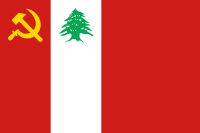Lebanese Communist Party
|
Lebanese Communist Party
الحزب الشيوعي اللبناني الحزب الشيوعي اللبناني |
|
|---|---|

|
|
| Leader | Hanna Gharib |
| Founded | 1924 |
| Preceded by |
Syrian–Lebanese Communist Party Lebanese People's Party |
| Headquarters | Beirut |
| Youth wing | Union of Lebanese Democratic Youth |
| Ideology |
Communism Marxism–Leninism Anti-Zionism |
| Political position | Left-wing |
| International affiliation |
International Conference of Communist and Workers' Parties International Communist Seminar |
| Colors | Red |
| Parliament of Lebanon |
0 / 128
|
| Website | |
| http://www.lcparty.org | |
| Lebanese Communist Party | |
|---|---|
| Participant in Lebanese Civil War (1975-1990) | |
| Active | present |
| Groups | Lebanese National Movement (LNM), Lebanese National Resistance Front (LNRF) |
| Leaders | George Hawi, Elias Atallah |
| Headquarters | Zarif (Beirut), Hula, Lebanon South Lebanon |
| Strength | 2,000 fighters |
| Originated as | 5,000 fighters |
| Allies | Lebanese National Resistance Front, Palestine Liberation Organization (PLO), Syrian Social National Party (SSNP), Communist Action Organization in Lebanon, Lebanese National Movement, Popular Front for the Liberation of Palestine (PFLP), Progressive Socialist Party (PSP), Syrian Army, Hezbollah, Amal Movement |
| Opponents | Lebanese Forces, Tigers Militia, Kataeb Party, Guardians of the Cedars, Israel Defense Forces (IDF), South Lebanon Army (SLA), Al-Murabitoun, Islamic Unification Movement, Syrian Army |
The Lebanese Communist Party – LCP (Arabic: الـحـزب الشـيـوعـي اللبـنـانـي, transliterated: al-Ḥizb aš-Šuyūʿī al-Lubnānī) or Parti communiste libanais (PCL) in French, is a communist party in Lebanon. It was founded in 1924 by the Lebanese intellectual, writer and reporter Youssef Ibrahim Yazbek and Fou'ad al-Shmeli, a tobacco worker from Bikfaya.
The Lebanese Communist Party was officially founded on 24 October 1924, in the Lebanese town of Hadath, south of Beirut. The first meeting was made up of union workers, who formed independent unions for the first time in Lebanon (Previously, labor unions were controlled by the French). The meeting was also attended by scholars, academics, writers and journalists who were active in promoting the ideas of the French Revolution, and who were familiar with the writings of Karl Marx and Friedrich Engels. The party was founded to cover the area held under the French mandate, which is now Syria and Lebanon. Initially, the party's name was "Lebanese People Party", in an attempt to evade the French ban on "Bolshevik" activities.
The party was declared illegal at first, but the ban was relaxed during World War II. For about twenty years, the LCP organized communist political activities in both Lebanon and Syria, but in 1944 the party was split into the Lebanese Communist Party and the Syrian Communist Party.
During the first two decades of Lebanon's independence, the LCP enjoyed little success. In 1943, the party participated in the legislative elections, but failed to win any seats in the Chamber of Deputies. The LCP ran for election again in 1947, but all of its candidates were defeated and the party was outlawed in 1948. During the 1950s, the party's inconsistent policies on Pan-Arabism and the Nasserite movement cost it support and eventually isolated it. The party was active against the government during the 1958 uprising. In 1965, the LCP decided to end its isolation and became a member of the Front for Progressive Parties and National Forces, which later evolved into the Lebanese National Movement (LNM) under Druze leftist leader Kamal Jumblatt. In the mid-1960s, the U.S. State Department estimated the party membership to be approximately 3000.
...
Wikipedia
